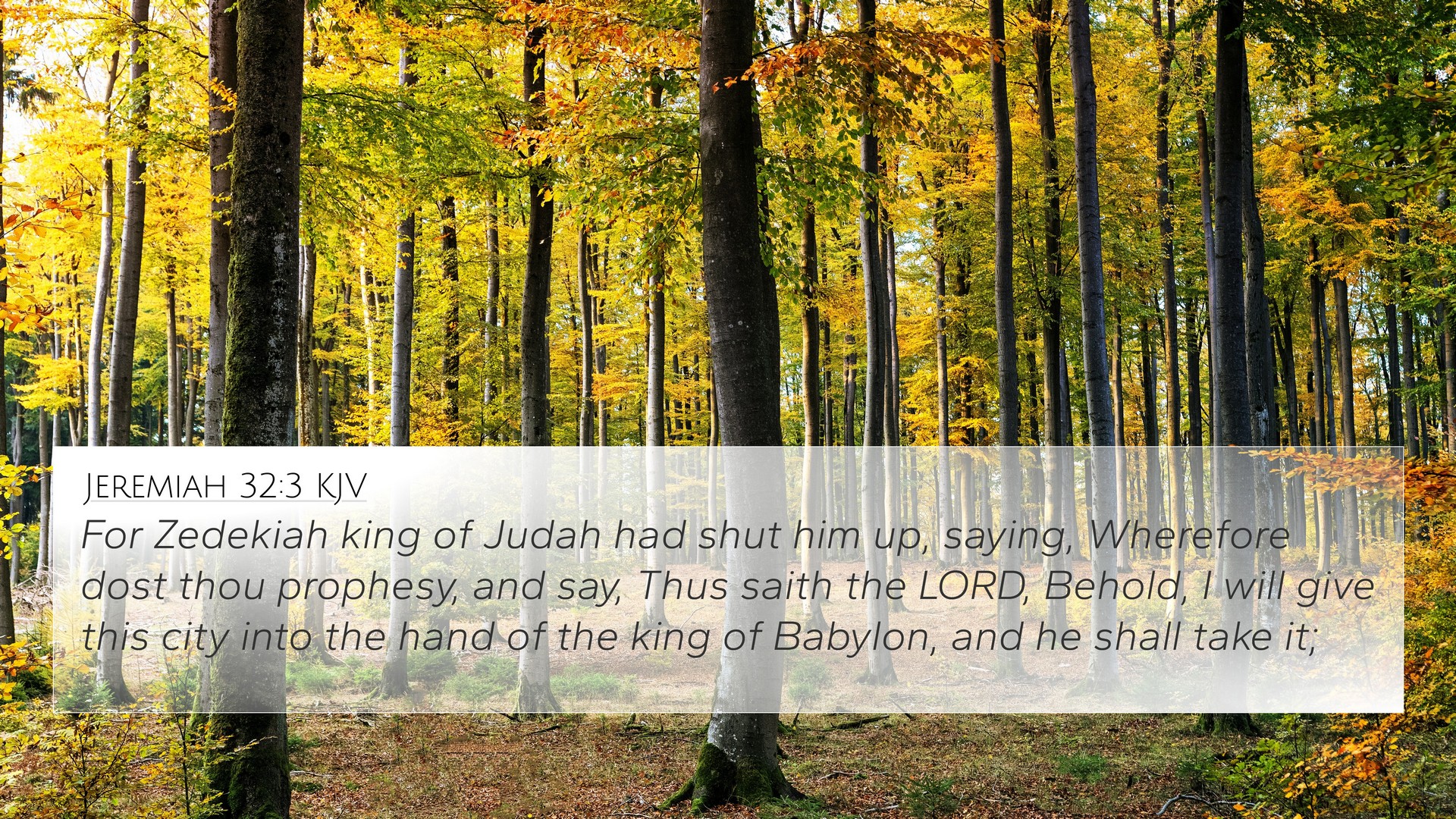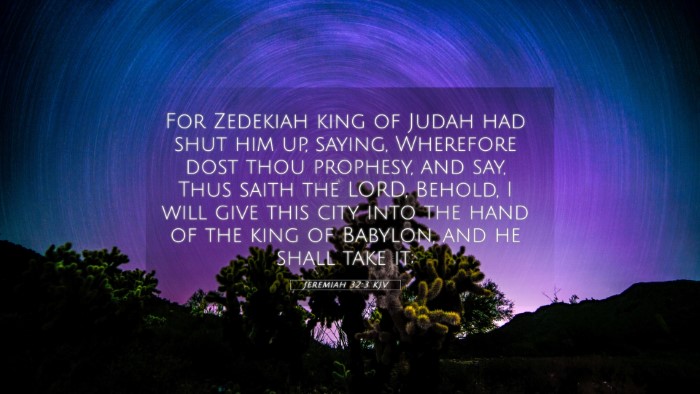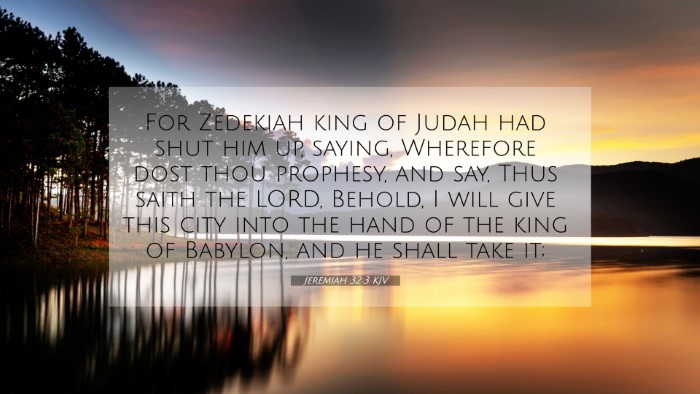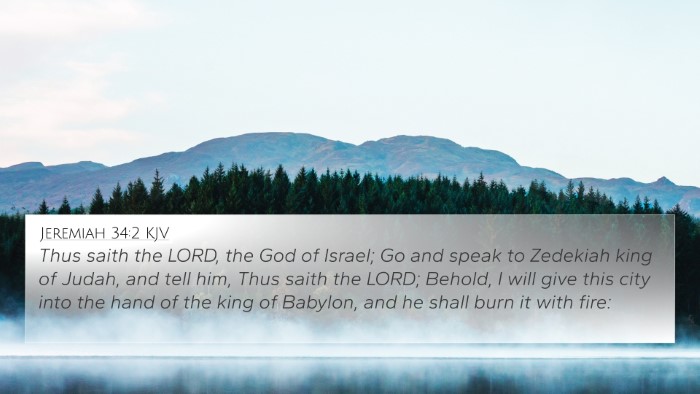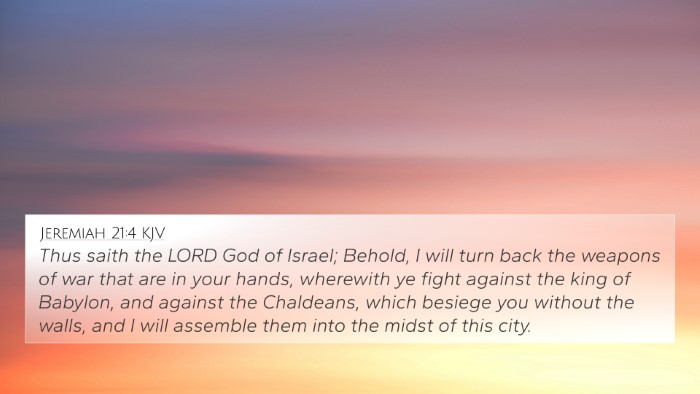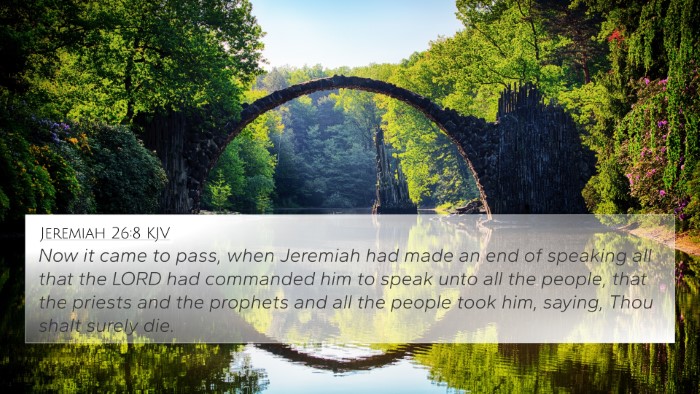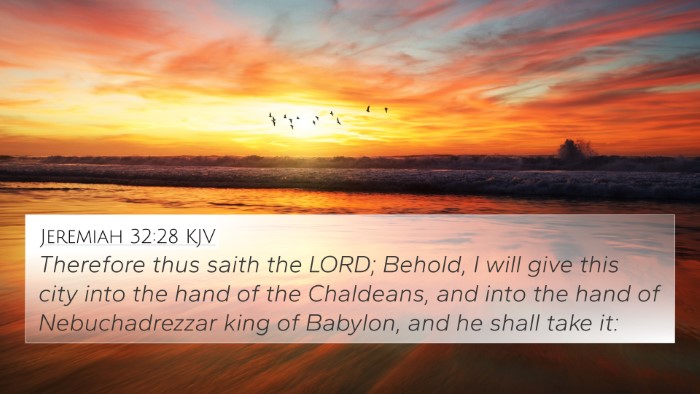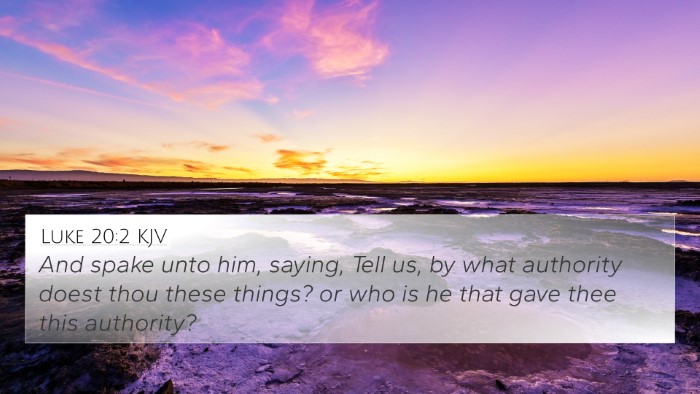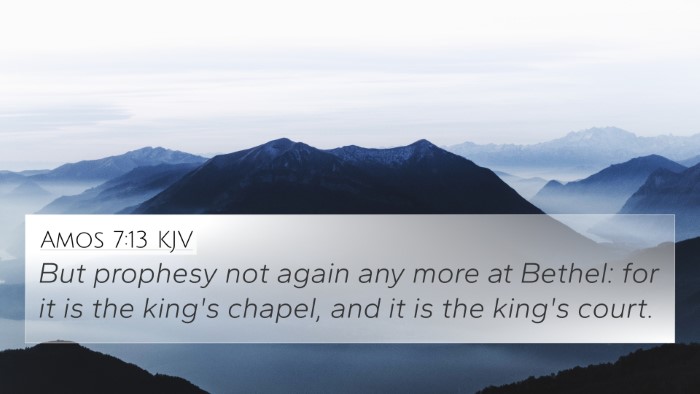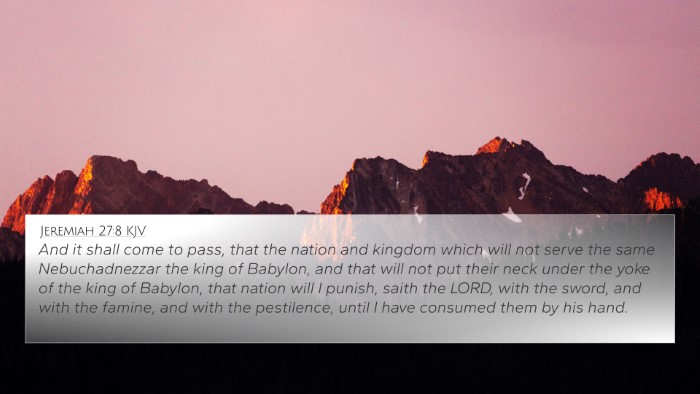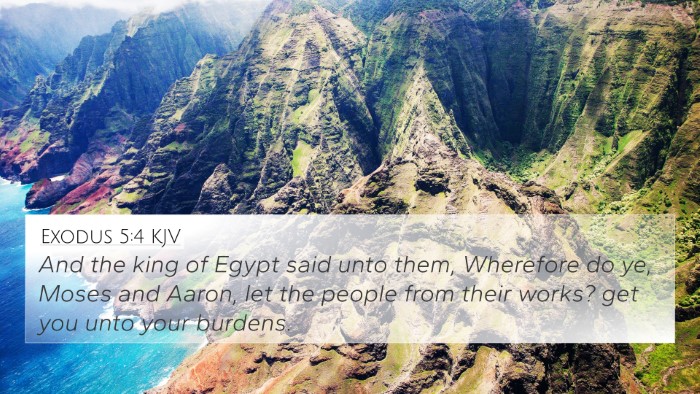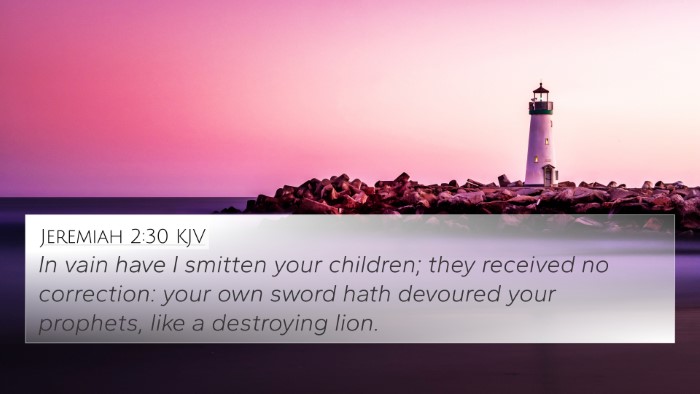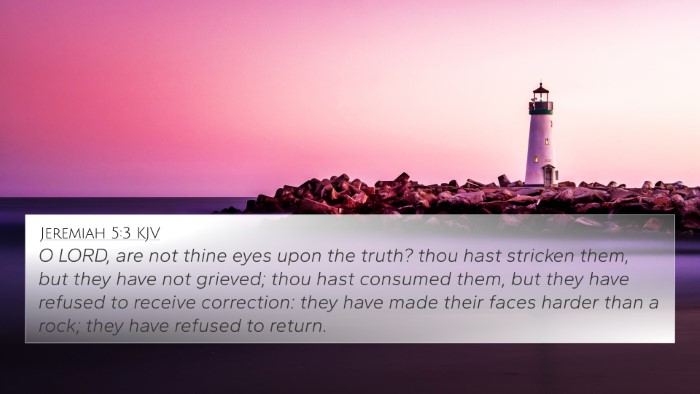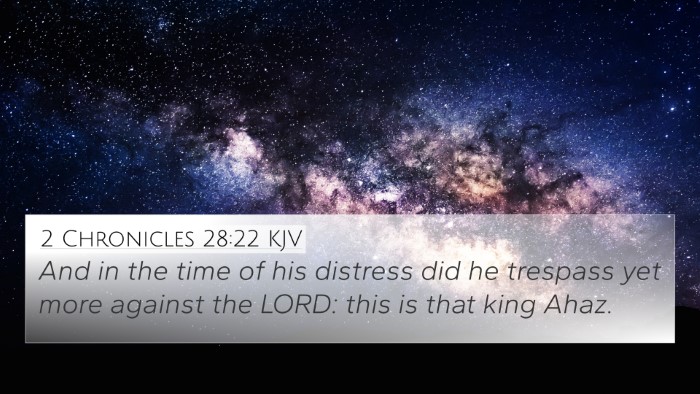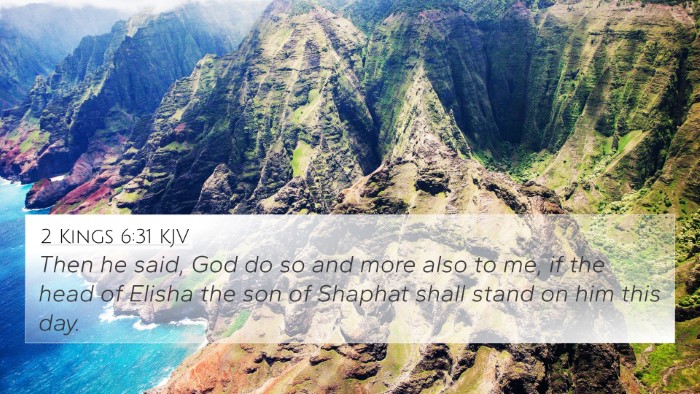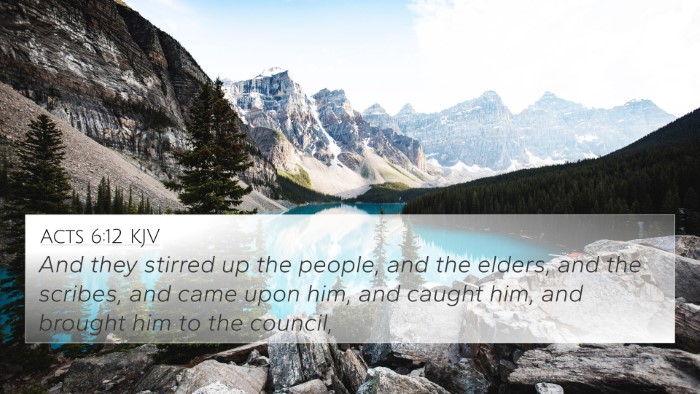Understanding Jeremiah 32:3
Jeremiah 32:3 (KJV): "For Zedekiah king of Judah had shut him up, saying, Wherefore dost thou prophesy, and say, Thus saith the LORD; Behold, I will give this city into the hand of the king of Babylon, and he shall take it."
Context and Historical Background
This verse occurs during a critical period when the nation of Judah is on the brink of destruction due to the Babylonian siege. Jeremiah, the prophet, faces persecution for his prophecies, which predict the impending destruction of Jerusalem. Zedekiah, the king, resorts to imprisonment to silence Jeremiah, highlighting the tension between divine prophecy and human authority.
Commentary Insights
Insights from various public domain commentaries help unravel the meaning and significance of this verse:
-
Matthew Henry:
Henry points out that Zedekiah's imprisonment of Jeremiah signifies a refusal to heed prophetic warnings. It reflects a broader theme of rebellion against God's will and the consequences that follow. The king's actions demonstrate the desperation of a ruler unwilling to accept divine judgment.
-
Albert Barnes:
Barnes emphasizes the significance of Jeremiah's message as one of urgent warning. By stating that God will deliver the city to the Babylonians, Jeremiah acts as a mouthpiece for God's judgment. This verse serves to illustrate the themes of sin, judgment, and the difficult position of a prophet in a hostile environment.
-
Adam Clarke:
Clarke provides further insight into the sociopolitical climate of the time, noting the king's attempts to suppress the truth. He suggests that Zedekiah's actions were motivated by fear and shame, reflecting a broader struggle between faithfulness to God's commands and the pressures of earthly power.
Key Theological Themes
Several critical theological themes arise from this verse:
- Divine Sovereignty: The verse underscores God's ultimate authority over kingdoms and nations, as He dictates the fate of Jerusalem.
- Human Rebellion: Zedekiah's refusal to heed Jeremiah illustrates the difficulty rulers and individuals face when confronted with uncomfortable truths.
- Prophetic Role: Jeremiah's position as a prophet showcases the hardships prophets often endure when delivering God's messages, especially under regimes hostile to divine communication.
Cross-References
This verse can be connected to several other biblical passages that deepen our understanding of its meaning:
- Jeremiah 1:10: "See, I have set thee this day over the nations and over the kingdoms, to root out, and to pull down, and to destroy, and to throw down, to build, and to plant." This reinforces Jeremiah's role as a prophet.
- 2 Kings 24:2: "And the LORD sent against him bands of the Chaldees, and bands of the Syrians, and bands of the Moabites, and bands of the children of Ammon, and sent them against Judah to destroy it..." showing God's active role in the events transpiring in Judah.
- Ezekiel 12:2: "Son of man, thou dwellest in the midst of a rebellious house..." reflecting the unresponsiveness of the people to the warnings of God through prophets.
- Jeremiah 38:6: "Then took they Jeremiah and cast him into the dungeon of Malchiah the son of Hammelech, that was in the court of the prison: and they let down Jeremiah with cords..." showing the further consequences of King Zedekiah's actions against Jeremiah.
- 1 Peter 2:12: "Having your conversation honest among the Gentiles: that, whereas they speak against you as evildoers, they may by your good works, which they shall behold, glorify God in the day of visitation." This illustrates the theme of maintaining integrity in the face of persecution.
- Isaiah 39:6: "Behold, the days come, that all that is in thine house, and that which thy fathers have laid up in store unto this day, shall be carried to Babylon..." indicating the prophetic messages regarding Babylon's impending dominance.
- Matthew 5:10: "Blessed are they which are persecuted for righteousness' sake: for theirs is the kingdom of heaven." This reflects Jesus' teaching on the blessings that accompany suffering for God’s sake.
Thematic Connections
This verse connects to larger biblical themes of judgment, hope, and restoration:
- Judgment and Accountability: God's judgment against Jerusalem serves as a reminder of accountability for sin.
- Prophetic Legacy: Jeremiah's ministry connects with the ongoing prophetic tradition throughout the Bible, underscoring the continuity of God's messages to humanity.
- Hope in Redemption: Although Jeremiah prophesies destruction, he also speaks of future restoration, highlighting the dual aspect of God's plan for His people.
Conclusion
Jeremiah 32:3 is a profound verse that encapsulates the struggles of prophecy in a time of national crisis. By examining the context and employing biblical cross-referencing, deeper insights can be gained into God's messages throughout Scripture. The connections between this verse and others underscore a rich tapestry of God’s redemptive narrative, offering both warnings and hope for His people.
Further Study
To explore the themes and messages further, consider utilizing tools for Bible cross-referencing, including a Bible concordance or a Bible cross-reference guide. These resources can help enrich your understanding of how different verses relate to one another, providing comprehensive insights into Biblical texts.
